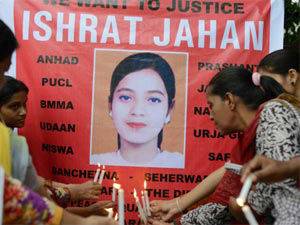 New Delhi, Feb 6: Former IB officer Rajendra Kumar has been named as the main accused, while three serving IB officials--- P Mittal, MK Sinha and Rajiv Wankhede--- too have been charged with murder and criminal conspiracy.
New Delhi, Feb 6: Former IB officer Rajendra Kumar has been named as the main accused, while three serving IB officials--- P Mittal, MK Sinha and Rajiv Wankhede--- too have been charged with murder and criminal conspiracy.
HT had first reported on December 2 that the CBI supplementary chargesheet may not name Shah due to lack of evidence. HT also first reported on December 17 about the findings that worked in Shah’s favour: he was not present in Ahmedabad when the fake encounter occurred.
DG Vanzara, who was then deputy commissioner of the Ahmedabad Crime Branch, and who has been named in the first chargesheet has alleged that Shah was aware of the encounter and the policemen were only following government orders.
Ishrat Jahan, a 19-year-old college student, was killed along with Pranesh Pillai, Amjad Ali and Zeeshan Johar on the outskirts of Ahmedabad on June 15, 2004 by a team of the Gujarat Police’s Crime Branch.
The police had claimed that the IB had informed them that the four persons were terrorists on a mission to kill Gujarat chief minister Narendra Modi.
The naming of Kumar, who retired on July 31, had created a row between the CBI and the home ministry and IB, with the latter insisting the officers had done their job by passing on the intelligence and its officer did not authorize or participate in the staged gunfight.
The CBI in July last year said that Kumar, a 1979 batch IPS officer of Manipur-Tripura cadre, went beyond generating input and actively participated in the conspiracy to kill Ishrat and others.
His juniors in Ahmedabad IB office picked Ishrat and her former employer Javed from a toll plaza and illegally confined them where Kumar interrogated them.
The agency has alleged that Kumar was instrumental in arranging weapons that were planted at the encounter site.
Director Intelligence Bureau Asif Ibrahim had reportedly personally ran from pillar to post to get justice to Rajender Kumar and shield the over 150-year-old institution from CBI's intrusive eyes.





Comments
Add new comment